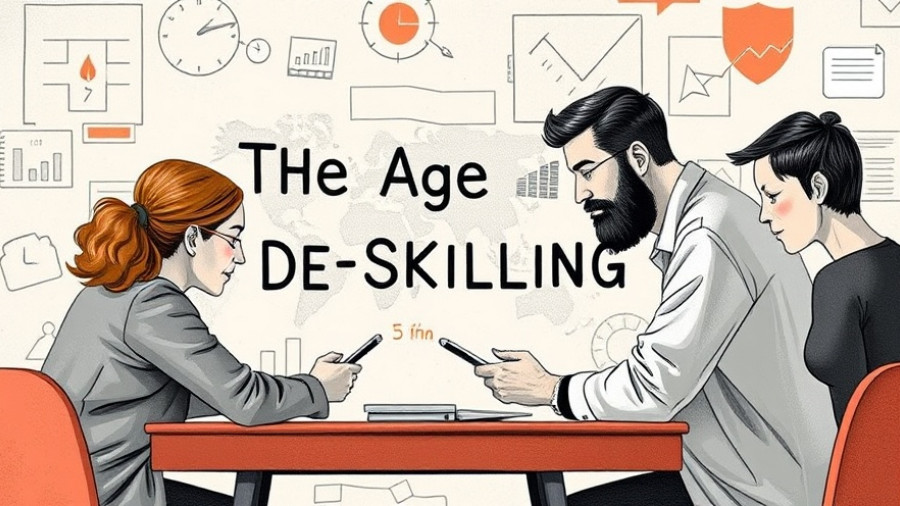
The De-Skilling Dilemma in the Age of AI
In our rapidly evolving digital landscape, the advent of artificial intelligence (AI) has sparked discussions about its implications for our skills and capabilities. The intriguing concept of 'de-skilling,' as highlighted by Kwame Anthony Appiah in his article in The Atlantic, underscores the complex relationship between humanity and technology. As we navigate through this 'age of de-skilling,' it is critical to explore how AI reshapes our understanding of skills, collaboration, and mental health.
Understanding De-Skilling: A Collaborative Web
De-skilling refers to the phenomenon where certain skills begin to diminish as technology takes over activities once performed by humans. Appiah posits that knowledge is not simply an individual's possession but a relationship born out of interdependence. This perspective aligns with findings from studies showing that many people rely increasingly on AI tools in their daily tasks. As collaboration becomes more complex, so too does the understanding of what it means to 'know' something. Today's workforce thrives within a network of specialists and machines, reshaping the traditional notions of expertise.
AI as a Tool for Mental Health Management
As we increasingly rely on AI for various tasks, mental health implications remain paramount, particularly for vulnerable populations like students, caregivers, and the elderly. Tools that assist in anxiety management and mental health awareness have emerged, leveraging AI to offer personalized support through apps and online resources. Such innovations offer coping strategies that can alleviate stress and anxiety symptoms, underscoring the importance of mental health in the context of technological advancement.
The Shift from Production to Appraisal
According to Appiah, the integration of AI into workflows leads to a significant transformation in the role of human expertise. Rather than solely producing content, human skill now emphasizes appraisal—evaluating and overseeing outputs generated by machines. For example, in coding, scholars have noted that the use of AI tools like GitHub Copilot allows human coders to focus on enhancing the quality of their work, pivoting the role of expertise in meaningful ways. This evolution could create new opportunities for developing skills related to quality assurance, critical thinking, and contextual understanding.
Collaborative Intelligence: When Humans and AI Work Best Together
Different tasks require different approaches, and research indicates that the combination of human intelligence and AI can sometimes yield greater results than either could alone. The MIT Sloan research points to scenarios where humans excel—such as tasks relying on contextual understanding—showing substantial performance improvements when paired with AI. This finding suggests that organizations can enhance productivity and innovation through effective collaboration, aligning with findings from Workable, which highlight that AI fosters teamwork by streamlining communication and project management processes.
Repercussions on Employment and Skills Development
Despite the optimistic potential for AI in augmenting human labor, concerns about job displacement remain prevalent. Society faces the challenge of adapting to these changes—understanding that de-skilling is accompanied by a need for reskilling. Organizations can assist employees in navigating this transformation by prioritizing continuous professional development. Studies show that fostering environments that encourage upskilling may lead to more resilient workforces capable of adapting to changing demands in the AI-driven market.
Future Predictions: Navigating the Age of De-Skilling
As we foresee future advancements, one can predict that the relationship between AI and human workers will evolve even further. The emergence of new roles focused on synergy between humans and AI suggests that adaptation will define the future of work. Strategies such as mental health policy reform and workplace wellness initiatives will be crucial in addressing the psychological impacts of these changes. Understanding AI as a complementary tool, rather than an adversarial force, will be essential to thriving in this new era.
Conclusion: Embracing Change and Facilitating Growth
In conclusion, navigating the 'Age of De-Skilling' necessitates a strategic approach that acknowledges the transformative power of AI while prioritizing mental health and collaborative work. By fostering a culture of learning and communication, individuals and organizations can flourish despite the pressures of technological integration. As we continue to evolve with these new tools, embracing change should not be feared; instead, it offers us the unique opportunity to redefine our skills, collaborate robustly, and support mental wellness. The path forward requires courage, adaptability, and a profound understanding of what it means to be human in an increasingly automated world.
 Add Row
Add Row  Add
Add 




Write A Comment